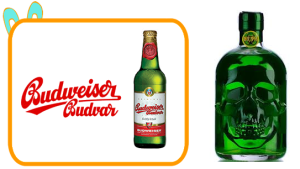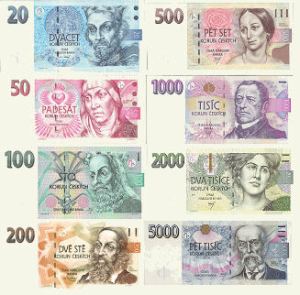I’ve never been to central Europe before. I’ve been to eastern countries in Europe like Cyprus and Turkey, but I’ve never been to those countries in the middle that are further north, and I admittedly don’t know all that much about them. Most of what I know about these places come from preconceptions; the Germans have an infamously bad sense of humour, everyone in Spain has a nap in the middle of the day, and the driving in Russia is only for the brave. It’s said that this kinds of national stereotyping is often based on some semblance of truth, but obviously a sweeping generalisation is never going to be particularly accurate. I thought it’d be interesting to share my own preconceptions of what the Czech Republic is like and do a little research to see whether they hold true or are completely wrong.
Preconception 1: Czech people like a drink
One of the things I regularly heard about the Czech Republic when I was a student is that the country is the home of the scariest of spirits: absinth, and a lot of great beers, such as the original Budweiser.

Though not as well known for its brewing tradition in the same way neighbouring Germany is, drinks are typically one of the first things that spring to mind when you think of the Czech Republic, and when a country is known for tipple it’s a fair bet that the natives are pretty fond of the stuff themselves.
Preconception: True!
Though absinth is a speciality drink that tends to be more of a novelty than a regular, the Czech Republic is officially the most beer-drinkingest nation in the world, consuming almost double the amount of beer per-person than the United States. Beer (‘Pivo’ in Czech) is an integral part of Czech culture, and appears regularly in foods and soups. The country is the home of the world’s first Pilsner ‘Pilsner Urquell’, and though it can’t boast as having many breweries as say Germany or Belgium, Czech beer is popular across Europe; I can usually find a few different Czech beers when I go to the nearest supermarket. Though obviously I’m presuming at this point, I can imagine beer, trying new beers in particular, to be a regular element to this blog.
Preconception 2: The Bohemian Lifestyle
Vincent Van Gogh! Jack Kerouac! Django Reinhardt! Ernest Hemingway! The Bohemian lifestyle is something that conjures vivid images of creative types living very unorthodox (and often impoverished) lives. Essentially take the English eccentric and make them much more artistic, expressive, and generally cooler, and you’re on your way to imagining the traditional definition of a person living a bohemian life. It’s a term that’s lost some of its gravitas in recent years as fashion circles have taken to using it to mean ‘dressed a little weirdly’ but to most a Bohemian lifestyle is one wrapped up in the creative arts. The old-fashioned English name for the region that is the modern Czech Republic was Bohemia, and a lot of famous Bohemian types, such as Hemingway and Van Gogh, were known to be very fond of Absinth, so the Bohemian lifestyle must surely originate from, well, Bohemia.
Preconception: Wrong!
The association with the word ‘Bohemian’ and an unorthodox lifestyle comes from gypsies in France in the 19th century, who were believed to have come to France from Bohemia. Modern consensus is that Czech people have very little in common with ‘western’ Bohemianism; Czech people are generally considered quite quiet and polite, with a formidable reputation for being the home of the ‘socks with sandals’ look. Any big city is going to have its artistic and alternative communities, Prague being no exception, but to imagine the entire country to share in this kind of creative flair. It’d be hard to get the trains to run on time if everyone was busy smoking and painting, for a start.
Preconception 3: The cost of living
So in my first preconception I mentioned that the big reason me and my friends wanted to go to Prague when I was in college was that it was the home of a lot of really great drinks. I lied. Well kind of. The real reason we wanted to visit was because Prague was known as the place you could buy a pint of beer for 30p and do a full weekend there – flights, accommodation, and spends, for under £200. When you’re a poor student that’s incredibly appealing, and in truth it’s still very appealing now, though these days I’m fuelled less by tipple and more by adventure. If a pint of beer is 30p, roughly a tenth of what you might expect in many UK pubs, then surely the cost of everything else will also be impressively low.
Preconception: True!
A quick search instantly confirms this one. Though the cost of living in the Czech Republic has risen considerably in the last 10 years, it’s still generally a great deal cheaper than most places in the EU, and the cost of staying in a hostel is impressively cheap. Being the capital, Prague is the most expensive place to live in the country, but the old ‘beer is very cheap’ adage still holds up, in fact the cost of a beer is often cheaper than a bottle of water.
The thing with all of these preconceptions, though, is even though I’ve gone into them in a little more detail here and denounced one of them, I’m still making preconceptions, I’ve just used google to back me up a bit. No matter how much I write about it on here the only way I can really account for these preconceptions is to get out there into the country and see it for myself first-hand.


